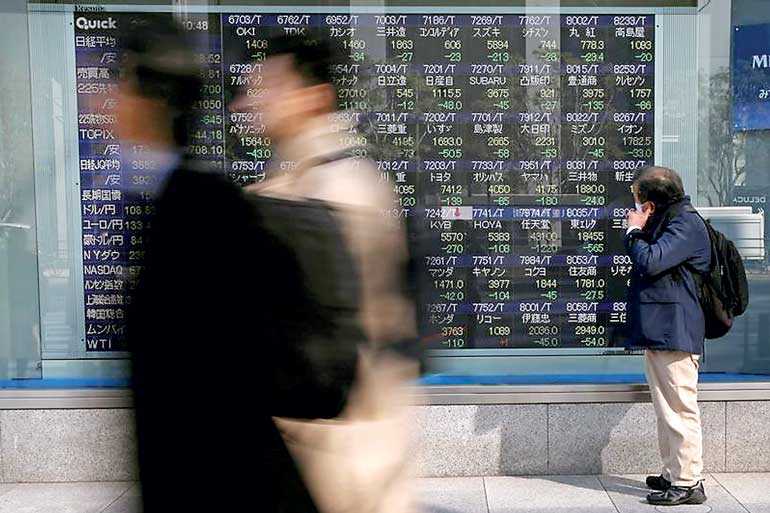Tuesday Feb 24, 2026
Tuesday Feb 24, 2026
Tuesday, 15 May 2018 00:00 - - {{hitsCtrl.values.hits}}

London (Reuters): Prospects of a thaw in US-China trade tensions supported global stocks yesterday (14 May), as US President Donald Trump pledged to help ZTE Corp “get back into business, fast” after a US ban crippled the Chinese technology company, while oil prices retreated from highs.
Trump’s comments on Sunday (13 May) came ahead of a second round of trade talks between US and Chinese officials this week to resolve an escalating trade dispute. China had said last week its stance in the negotiations would not change.
The MSCI world equity index, which tracks shares in 47 countries, was up 0.1%, holding at its highest level in seven weeks and in positive territory for the year. European stocks were broadly flat as energy stocks and financials weighed.
“There have been some very serious issues raised in terms of the trade relationship between the US and China, and then they’ve had this quite sudden about-turn on this particular company, and it simply raises questions as to what the underlying policy is,” Alastair George, chief strategist at Edison Investment Research, said.
“This is perhaps a little reminder which is being relatively well-received by markets over the last 24 hours that (with) the US administration there is a strong degree of unpredictability compared to prior regimes,” George added.
The United States has said it will lift sanctions on Pyongyang if North Korea agrees to completely dismantle its nuclear weapons program. Stocks in Asia were also upbeat. MSCI’s broadest index of Asia-Pacific shares outside Japan rose 0.5%, while Japan’s Nikkei also tacked on 0.5%.
Chinese shares came off the day’s highs but were still higher after Trump’s comments on ZTE Corp, which JPMorgan analysts said was “a significant positive.”
Shanghai’s SSE Composite index rose 0.3% while the blue-chip rallied 0.9%. Hong Kong’s Hang Seng index climbed 1.4%.Elsewhere in Asia, the Malaysian ringgit recovered losses after sliding 1% to a four-month trough against the dollar in the first onshore trade since a shock election upset last week. Malaysian stocks sank as much as 2.7% at one point but were last up 1.5%.
Veteran Mahathir Mohamad came out of political retirement to lead the opposition Pakatan Harapan (Alliance of Hope) to a stunning victory defeating Prime Minister Najib Razak, a former protégé he had accused of corruption.
Some investors were concerned that populist promises such as repealing an unpopular goods and services tax and restoring a petrol subsidy could undermine the country’s finances.
Bengaluru (Reuters): Gold prices rose yesterday on the back of a subdued dollar as investors considered the prospects of fewer interest rate hikes in the United States this year.
Spot gold was up 0.2% at $1,320.45 per ounce as of 0330 GMT, after marking the highest since April 26 at $1,325.96 in the previous session.
US gold futures for June delivery were little changed at $1,320.50 per ounce.
The weakness in dollar is helping gold prices in Asia, a Hong Kong-based trader said. “Gold is consolidating. The (inflation) data gave people an opportunity to sell the dollar... and gold benefited from that,” the trader said.
The dollar eased 0.1% to 92.408 versus a basket of six major currencies, retreating further from its 2018 peak hit last week on the back of sagging US yields, after softer economic data last week curbed prospects of aggressive rate hikes in the United States.
London (Reuters): The euro headed for a third successive day of gains yesterday (14 May) as a weak dollar helped the single currency recoup losses, as investors kept a wary eye on political events in Italy.
Italy’s anti-establishment 5-Star Movement and the far-right League, both hostile to EU budget rules, spent the weekend in talks to forge a common policy program. The parties were adversaries as recently as March but now look likely to form Italy’s next government. The euro was 0.3% higher at $1.1972, having fallen last week to $1.1823, its weakest since 22 December.
“Italian politics aren’t a major moving factor in the euro zone yet. It’s not an existential threat and isn’t driving a lot of positioning or putting the euro’s bounce at risk,” said Manuel Oliveri, an FX strategist at Credit Agricole in London. “I expect inflation will rebound in the euro zone and that will keep the European Central Bank’s stimulus unwinding on track.”